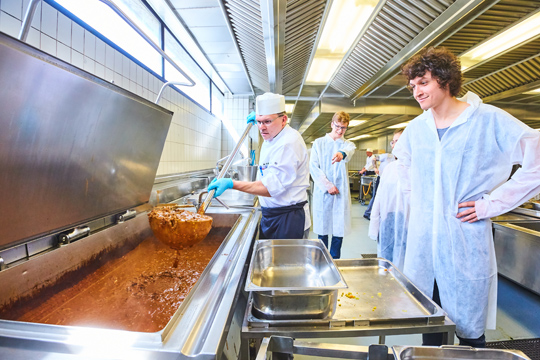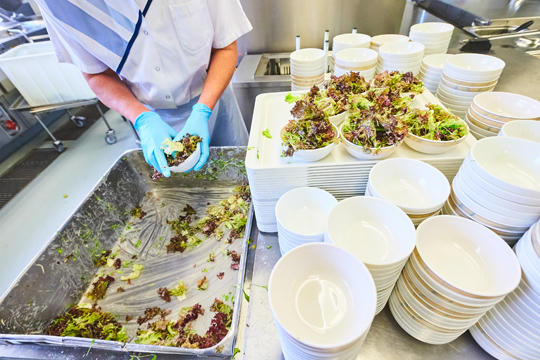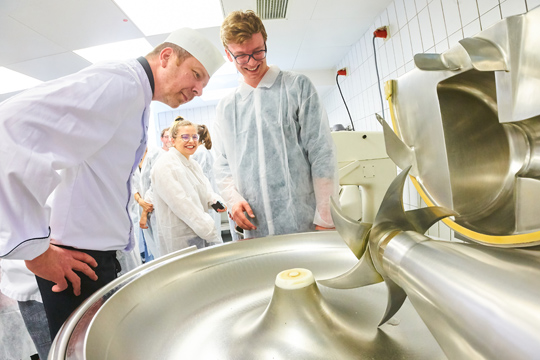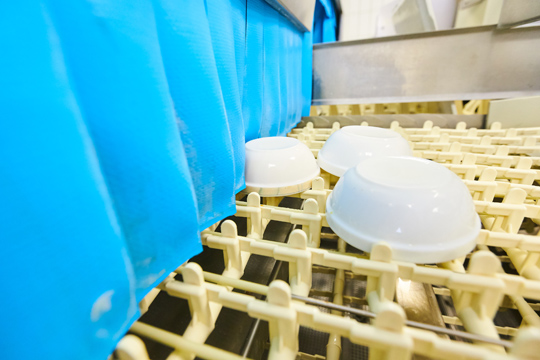Seconds, anyone?
Freiburg, Apr 29, 2019
The roller door goes up every morning at 6:30, when suppliers make deliveries to the mensa on Rempartstraße. Skill and precisely planned routines are what it takes to rapidly convert the groceries into healthy and tasty lunches. Mensa manager Carsten Höting gives students a tour to show them the secrets of cooking on an industrial scale.

Processed meals would be too expensive in light of the huge amounts of food the workers prepare at the mensas in Freiburg. That's why a great deal is made by hand. Besides, it's tastier as well. Photo: Harald Neumann
"There's the salad," says Carsten Höting, "150 kilograms per day to be exact." Höting is a qualified chef and manages the mensa on Rempartstraße. The cafeteria employs sixty people, making it Freiburg's largest university eatery. Höting stands in a kitchen in the basement. That's where salad and vegetables are washed and chopped. "Not every mensa still does this," says Höting. These days, many cafeterias rely on packaged and pre-washed products. "Our methods leave considerably more nutrients in the food," Höting explains to almost twenty students standing in front of him. They're taking part in a tour of the Freiburg mensa offered twice a year by the "Studierendenwerk."
"I've been studying here for five years. I finally wanted to know what I've actually been eating the whole time," says a young man who's on the tour. He says with a wink of an eye that he intentionally took the tour closer to the end of his time at the university: "It could be that I learn something that I don't find to my taste at all." His concerns are completely unfounded. Right from the first stop on the tour, it becomes clear that the food at the mensa is good and healthy. It starts at the receiving dock. Every working day, the roller door goes up at 6:30 a.m. Suppliers are already waiting with their deliveries.

Every day 150 kilograms of salad are served at the mensa on Rempartstraße.
Photo: Harald Neumann
Regional products preferred
The wish for regional products and short delivery routes is an imperative at the mensa. The "spätzle," for example, which today are on the menu with a sauce of beef tips, come from a producer located in Reute bei Emmendingen. Fruits and vegetables come mainly from the surrounding area. Beef is sourced in Baden-Württemberg and the neighboring Allgäu. "Regional products are almost more important to people today than that they're organic," says Höting. But the mensa offers organic foods, too, just as it does vegetarian and vegan meals. "We're up on the latest trends and find out about what our guests want through our student workers, for example," the head chef explains. But there's also an electronic feedback system that makes it possible to react quickly. "Let's say the Bolognese sauce isn't seasoned properly," Höting says, providing an example. "If that feedback comes in repeatedly, we can respond within half-an-hour," he adds.
Höting now stands in a room with an enormous universal food processor that is lovingly known as the "moulinette." Its cutting blades rotate at 20 thousand revolutions per minute. "This is where we make our own pesto or hummus, too," he tells the students, adding that mashed potatoes or red cabbage are prepared here as well, almost as they were back in grandmother's day. First of all, it tastes better, says Höting. But there are genuine budgetary reasons for the choice: "For the amounts that we need, it would be much too expensive for us to rely exclusively on ready-to-eat products." Yet the mensa has to have some of those on hand too. But they're only used as emergency reserves.

A monster with teeth: The food processor's blade moves at 20 thousand revolutions per minute. Photo: Harald Neumann
Four thousand meals on average are handed across the counter daily on the Rempartstraße. A visitor wants to know how much the meals cost per plate. Höting answers, "That depends on the ingredients, and there's no way you can do it for less than five euros." The student price of two euros and eighty cents is subsidized. "I can't remember last time the prices went up at all," Höting continues, "and I've been here for thirteen years already." A native of Osnabrück, Höting learned his trade in restaurant kitchens and had already done large-scale catering in Heidelberg before he came to Freiburg.
One tray at a time, un-stacked, and no scraps of paper, please
The mensa manager points to a line of stainless steel plates near the ceiling. Above these is a conveyor that carries the trays to the dish washing room. All the visitors remember the warnings posted where they return their trays. One student asks why it is so very important not to leave used paper napkins on the plates. "They could fall down when the trays are moving," explains Höting. "If they get stuck on a light sensor, then the conveyor stops. I know that the students mean well when they clear up and pile trays, plates, and bowls on top of each other," says Höting. But stacked crockery can bring the conveyor system to a screeching halt, too.
There are little incidents on the line daily and major ones once or twice a week. That's when a technician has to come, find the sticking point, and then remove the steel plating to clear the jam. The students nod in respectful awe. They all make the impression that from now on they will give this message about returning dirty dishes to the conveyor: One tray at a time, un-stacked, and no loose bits of paper, please!

Keep it flat: Stacked crockery and trays do not belong on conveyor belts.
Photo: Harald Neumann
One of the visitors addresses the issue of leftover food. "The law says that's what's left on the plates cannot be reused," says the mensa manager. It must be disposed of and finds its way into a biogas plant. Höting says, "During preparation and processing of ingredients, we try to be as careful as possible." That's why there are only 35 grams of waste per meal, including what's left after cleaning vegetables. That's an outstandingly low figure. Forward-looking planning helps. "Take menus. If we still have carrots after making the vegetable curry from today, tomorrow they can be used in a soup," Höting says.
The tour ends where the meals are handed out on the main floor and in the kitchen behind it. Large machines imported from Italy and unique to big German catering kitchens can make spätzle and pasta almost completely automatically. We see the finely chopped vegetables again, now cooked and seasoned, as a side dish for the beef tips' sauce. Despite all the racket, there's a concentrated, almost reverent mood in the hall, and a certainly perceptible employee pride. The workers are pleased in the knowledge that in well-organized routines and with a great deal of skill they convert quality ingredients into healthy, varied meals. The clock shows 12:30 p.m. "It's lunchtime," growls the stomach.
Mathias Heybrock

